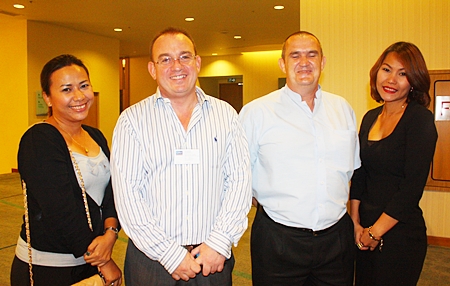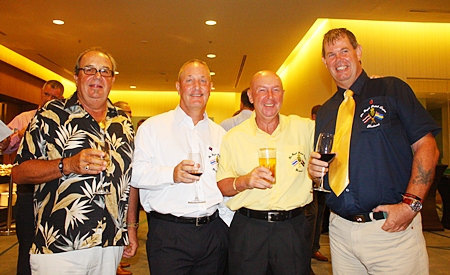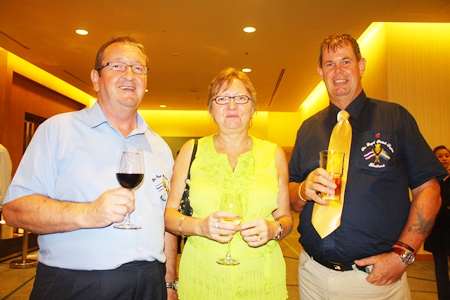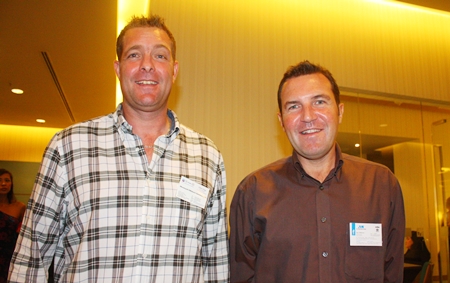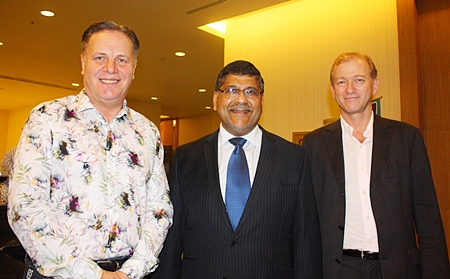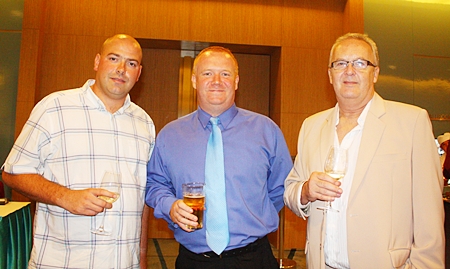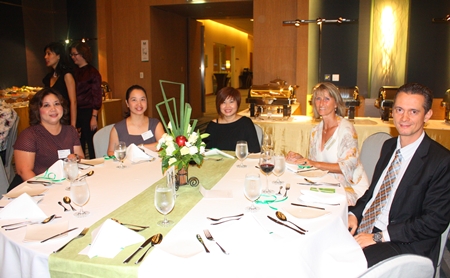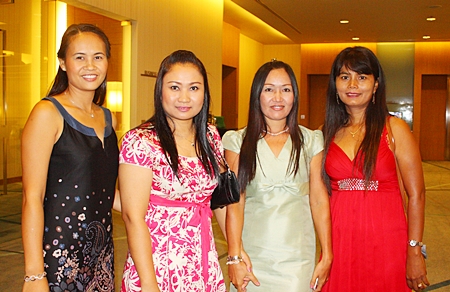HE Asif Ahmad had initially appeared an unlikely choice for the British Ambassador to Thailand, and had been drafted in at short notice, but has ended his two year tenure as probably one of the more popular in the position.
With three weeks to go before he left Thailand, he addressed a dinner held in his honor at the Holiday Inn and as always, charmed the guests with his verbal eloquence and humorous delivery.
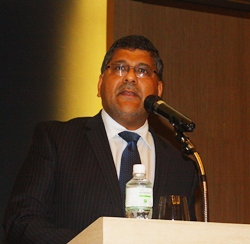 HE Asif Ahmad makes his farewell address.
HE Asif Ahmad makes his farewell address.
He brought up the major bone of contention between British pensioner ex-pats and the British government – the freezing of their state pensions, particularly as there are countries where the British pensioner does get the indexed pension, as opposed to Thailand. HE Asif did say that the cost of raising pensions world-wide would be 655 million pounds, and if the payment was back-dated the global cost would be 5 billion pounds. Appearing as an ‘excuse’ he said that Ministers are not going to give overseas Britons priority over what they see as more pressing needs at home. Of course overseas pensioners will point to their own “pressing needs”, and it could be argued that the back-dated 5 billion pounds represents not a saving for the UK, but a pinching from the pockets of its pensioners.
In his farewell address, he mentioned passport services, the Immigration police detention cell, his admiration for Mayor Itthiphol Kunplome, British cons attempting to turn Pattaya into another “Costa del Crime”, the perceived inefficiencies of the Thai Police as being “slow and half-hearted”, tourist scams such as the jet skis, the (mis)treatment of Burmese laborers, the poor English language skills in the indigenous Thai population and other items where he could see Thailand was lacking, but completed his address by saying, “And yet this country keeps bouncing back, the people keep smiling and life goes on. And that is what I leave this country with. A great admiration for the resilience of the people. Admiration for the way in which families hold together. An admiration for how old people are treated here. With care and respect.”
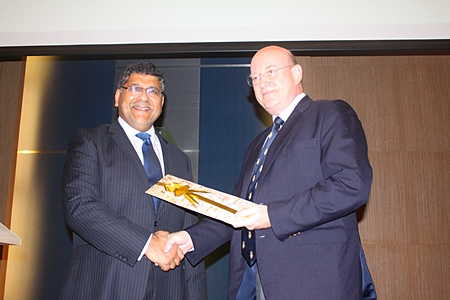 Former BCCT Chairman Graham Macdonald (right) presents a gift to the departing British Ambassador to Thailand HE Asif Ahmad.
Former BCCT Chairman Graham Macdonald (right) presents a gift to the departing British Ambassador to Thailand HE Asif Ahmad.
He finished by mentioning his successor Mark Kent, who has spent two years learning to read and speak Thai and finally expressed his thanks to the British Chamber of Commerce for arranging the evening (and its sponsors) and a tribute to the Royal British Legion “who have done their part to make a little part of Thailand, a land fit for heroes.”
HE Asif Ahmad chats with PMTV
On the same evening H.E. Asif Ahmad spoke to Sue Kukarja of PMTV. Below are excerpts of the interview:
Sue K: Are you leaving any unfinished business behind?
H.E. Asif Ahmad: No, it would be self-flattering for ambassadors to identify periods of a country’s history through their own term.
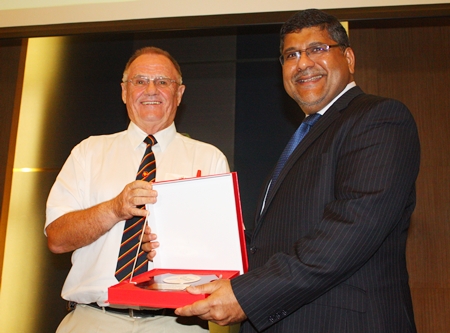 Representing the Royal British Legion, Derek Brook presents a plaque of appreciation to HE Asif Ahmad, British Ambassador to Thailand.
Representing the Royal British Legion, Derek Brook presents a plaque of appreciation to HE Asif Ahmad, British Ambassador to Thailand.
We are immaterial, the country’s life goes on for people who live and work here, the British who invest here … those are the real issues, not me who has been here for a short period or what I have done. I hope I have achieved something on the business side, for the welfare of citizens, and (hope) I delivered on the government’s priorities … recovering our economic prosperity.
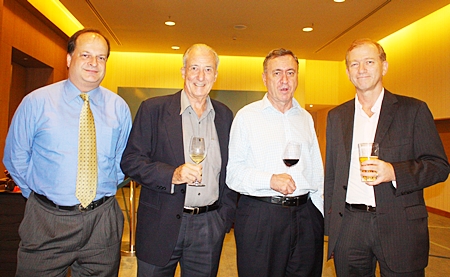 Stalwarts of the BCCT, (l-r) Greg Watkins, Executive Director BCCT, Dr Iain Corness, Pattaya Mail Media Group, Nigel John Cornick, Chief Executive Officer, Kingdom Property Co., Ltd and Simon Landy, Executive Chairman BCCT, C.I.T Property Consultants.
Stalwarts of the BCCT, (l-r) Greg Watkins, Executive Director BCCT, Dr Iain Corness, Pattaya Mail Media Group, Nigel John Cornick, Chief Executive Officer, Kingdom Property Co., Ltd and Simon Landy, Executive Chairman BCCT, C.I.T Property Consultants.
I go back from here to the UK to learn a foreign language for 12 months, and then I’m back again in Asia to a country not far from here… for 4 years. So in a way I’m really not going to be saying goodbye.
Sue K: What’s the biggest achievement during your time as the UK Ambassador here?
H.E. Asif Ahmad: One of them is, the single biggest investment last year in the UK from anywhere in the world was from Thailand. Sahavirya Steel invested in the Teesside Redcar steel plant. That deal itself will save 1,500 jobs, and it means the UK will export 1 billion pounds worth of steel into Thailand each year. That will wipe out the trade deficit we have so our total trade from 5 billion a year ago will go up to 6 billion. That is massive.
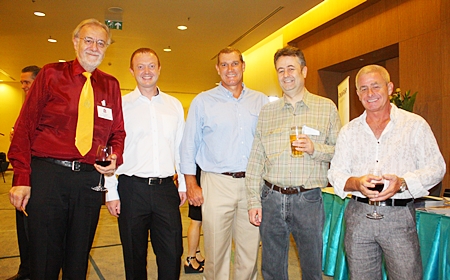 Bidding the ambassador a fond farewell are (l-r) Chris Thatcher, Director, BCCT, Stephen Tierney CeFA, Senior Client Advisor, Simon Philbrook, Sales Director, MBMG International, Mark Butters, Director, RSM Advisory Thailand Ltd and Lyndsey Rowe, Senior Client Advisor, MBMG International.
Bidding the ambassador a fond farewell are (l-r) Chris Thatcher, Director, BCCT, Stephen Tierney CeFA, Senior Client Advisor, Simon Philbrook, Sales Director, MBMG International, Mark Butters, Director, RSM Advisory Thailand Ltd and Lyndsey Rowe, Senior Client Advisor, MBMG International.
And then there are other things. Our own embassy is growing. When I came here there were 120 staff, by the time I leave it will be 150. That is because we are investing people in many areas: immigration, Home Office, the fight against crime, security issues, as well as Thai and regional politics, and lastly on our consular activities. Basically, while we are in a situation where we have to make cuts in other parts of the world, in Europe in particular, in Thailand we are actually expanding, which is a real sign where we think the British future lies.
Sue K: Any frustrations, such as things that you may have wanted do your way but not going as you would have hoped?
H.E. Asif Ahmad: Our job is to overcome frustrations. We’ve got to be resilient, and some things take a long time. What you’ve got to do is work with your contacts and I have spent a lot of time here dealing with members of the Royal family, the military, the Privy Council, the opposition politicians, and indeed the Government.
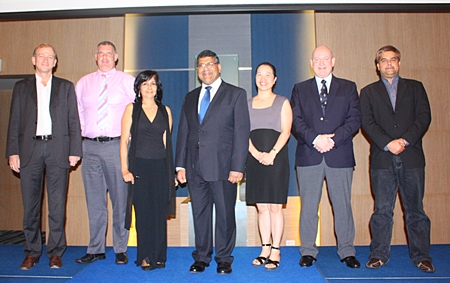 Line up of the sponsors of the special farewell dinner (l-r) Simon Landy, C.I.T. Property Consultants, Joe Cox, Defense International Security Services, Sue Kukarja, PMTV Director, Pattaya Mail Media Group, HE Asif Ahmad, British Ambassador, Isaraporn Kongchana, Finnair Plc, Graham Macdonald, MBMG International and Tony Malhotra, Pattaya Mail Media Group.
Line up of the sponsors of the special farewell dinner (l-r) Simon Landy, C.I.T. Property Consultants, Joe Cox, Defense International Security Services, Sue Kukarja, PMTV Director, Pattaya Mail Media Group, HE Asif Ahmad, British Ambassador, Isaraporn Kongchana, Finnair Plc, Graham Macdonald, MBMG International and Tony Malhotra, Pattaya Mail Media Group.
The fact that as I leave, I can invite the entire top team of Abhisit’s last cabinet to my house for lunch the other day, and next week I’m going to have eleven of the government’s ministers and former ministers.
It shows that we have this working link that I can pass on. I recently had an encounter in our house with Thailand’s most wealthy business person and he’s looking at substantial investments in the UK.
For me, it will be frustrating to think why these deals can’t come to fruition right now, because as I sent my last message back to London about the opportunities here, saying we’ve got 5 billion pounds worth of business we could be dealing with now. I get enough satisfaction from knowing that these deals are warmed up and ready to go and it’s for others to follow through. So in my job I don’t think we can personalize frustrations the way others might do.
Sue K: In which direction do you think Thai politics is going?
H.E. Asif Ahmad: If I really understood Thai politics, I’d be a very rich man. I think what is good is that all sides have tried extreme measures and they haven’t’ worked. So hopefully, they’ll see sense and revert to what I call normal politics. Win an election on the base of what you have promised to the people; be accountable for what you promised to the people, then if you haven’t delivered them, the people should vote them out.
